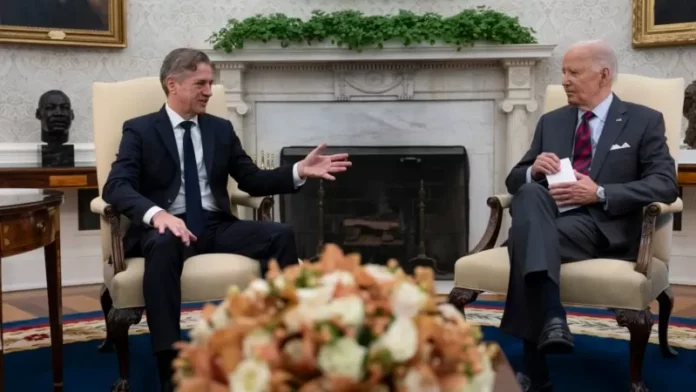President Joe Biden welcomed Slovenian Prime Minister Robert Golob to the White House on Tuesday, highlighting the importance of European unity and recognizing Slovenia’s significant role in the recent prisoner exchange between the United States and Russia.
During their meeting in the Oval Office, Biden expressed his gratitude to Golob for Slovenia’s critical role in the August swap, which saw the release of 24 individuals, including three high-profile Americans held in Russian custody: Wall Street Journal reporter Evan Gerskovich, Radio Free Europe reporter Alsu Kurmasheva, and former U.S. Marine Paul Whelan. In return, Slovenia released two Russian spies, a crucial part of the deal.
“Thank you for making it possible,” Biden said to Golob. “This serves as a clear message to anyone who doubts the importance of our allies. Just look at what you have done. Our allies matter greatly.”
Biden also reflected on his role in advocating for Slovenia’s membership in the North Atlantic Treaty Organization (NATO) nearly two decades ago. He emphasized the significance of European unity, both diplomatically and through institutions like NATO, in countering Russian aggression in Ukraine.
“I knew then what I know now: We are stronger when we stand together with good partners like you,” Biden stated. “We have seen this in our support for the brave people of Ukraine as they defend themselves against Russian aggression, and in our efforts to promote democracy and prosperity in the Western Balkans.”
In his address to Biden, Golob used the endearing term “Dear Joe,” which has become popular among European leaders.
“Mr. President, dear Joe, just a few words,” Golob said in English. “With the help of true friends, nothing is impossible. Our joint effort in the prisoner exchange demonstrated this to the world. Let us continue to work together in true friendship and with the support of many friends.”
The two leaders also discussed a wide range of issues, including energy security, cooperation, and events in the Middle East, according to the White House.
This meeting, the first Oval Office visit by a Slovenian leader in 18 years, holds great significance for Biden’s administration, according to Wojciech Przybylski, editor-in-chief of the Warsaw-based think tank Visegrad Insight.
“Slovenia is a major stakeholder in the development of other Southeastern European countries in the Balkan region, where the U.S. is investing heavily to make Europe whole and free from wars and autocratic rule,” Przybylski said in an email to VOA.
“From a geopolitical perspective, the influence of Russia, and even more importantly, China, including Beijing’s ambitions to dominate the Slovenian port of Koper, a major port on the Adriatic Sea, is an important backdrop to discussions on the economic security of Central and Eastern Europe,” he added.
Donatienne Ruy, an analyst at the Center for Strategic and International Studies, also highlighted Slovenia’s contributions to transatlantic relations as a NATO and EU member.
“Slovenia, as the current holder of the rotating presidency of the U.N. Security Council, is actively supporting Ukraine and serves as an anchor for the Western Balkans region,” Ruy said in an email to VOA. She also noted that Slovenia could play a significant role in the European Commission’s enlargement efforts, as the top diplomat in line for the job is a left-leaning Slovene.
However, Ruy also acknowledged that Slovenia has had its share of ups and downs in governance, particularly under former Prime Minister Janez Jansa, who adopted an illiberal populist stance. She believes that the current government, which has been more positive in terms of governance and democracy, is deserving of the White House visit.
Dalibor Rohac, a senior fellow at the American Enterprise Institute, had a different perspective on the meeting.
“I do not see many reasons for rewarding Slovenia’s Prime Minister with a visit to the Oval Office,” Rohac wrote in an email to VOA. “Slovenia has made little progress in increasing its defense spending and has not made any significant purchases of U.S.-made equipment. Even in the EU context, the government has taken an extreme position against Israel.”
He also pointed out that the Prime Minister himself has faced domestic controversy, including a criminal complaint for interfering with a police investigation.
However, the Trump administration’s representatives did not respond to VOA’s inquiry about whether former President Donald Trump

